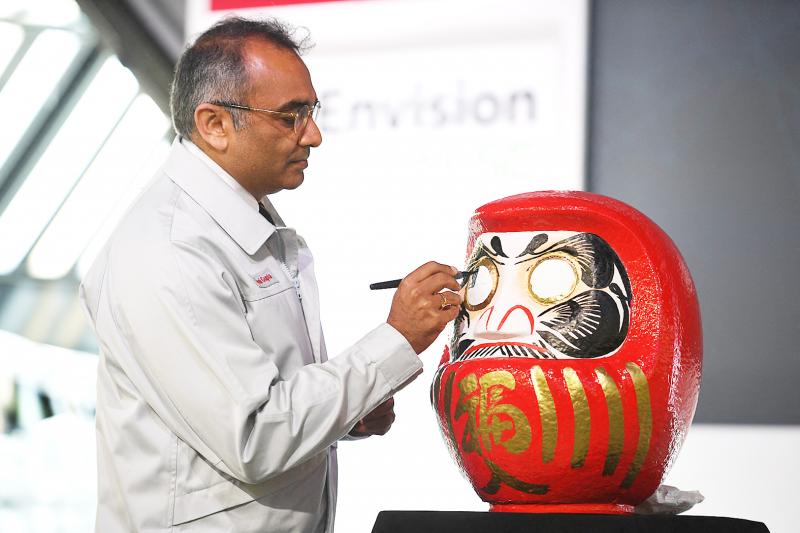Japanese auto giant Nissan Motor Co yesterday announced plans to build the UK’s first battery “gigafactory,” where it would also build a new electric vehicle.
British Prime Minister Boris Johnson hailed the post-Brexit investment totaling £1 billion (US$1.38 billion), which is set to create 6,200 jobs, as “a major vote of confidence in the UK.”
Nissan’s Chinese battery supplier Envision AESC (遠景動力) is to invest £450 million to build the battery plant that would be run on renewable energy and produce up to 100,000 Nissan electric vehicles per year.

Photo: AFP
The facility, which would be built next to Nissan’s largest European factory in Sunderland, England, was hailed as key to Britain’s transition away from fossil fuel-powered vehicles.
The news comes just days after Nissan’s French partner, Renault SA, on Monday unveiled plans for a Chinese-owned battery factory in France, as global automakers race to meet booming demand for greener transport and governments target net-zero carbon emissions by 2050.
Nissan is to spend up to £423 million on an all-electric vehicle, while Sunderland City Council would help bring the total amount of investment up to £1 billion.
“This is a landmark day for Nissan, our partners, the UK and the automotive industry as a whole,” Nissan chief operating officer Ashwani Gupta said at the unveiling of the EV36Zero project in Sunderland.
Nissan, which had warned that a no-deal Brexit would threaten its 35-year-old Sunderland factory, said that the new investment represents 6,200 jobs at the Japanese group and its British suppliers.
There would be 900 new Nissan jobs and 750 new Envision AESC jobs.
“This is a huge step forward in our ambition to put the UK at the front of the global electric vehicle race,” British Secretary of State for Business, Energy and Industrial Strategy Kwasi Kwarteng said.
“The cars made in this plant, using batteries made just down the road at the UK’s first at-scale gigafactory, will have a huge role to play as we transition away from petrol and diesel cars,” he added.
Nissan in 2013 established Britain’s first electric vehicle and battery production in Sunderland with its Leaf model.
The company more recently faced a series of trials, from weak demand during the COVID-19 pandemic to the fallout from the arrest of former Nissan chairman Carlos Ghosn, now an international fugitive after jumping bail and fleeing Japan.
Nissan has meanwhile delayed the planned summer launch of its flagship new electric Ariya model to late this year over a global chip shortage affecting automakers.
Announced in July last year, the new full-electric model was initially supposed to go on sale in Japan from the middle of this year, before arriving in Europe, North America and China by the end of this year.
In the UK, Envision Group (遠景科技集團) founder and CEO Lei Zhang (張雷), yesterday said that his company was building on its long-term partnership with Nissan “to make high performance, longer-range batteries for electric vehicles affordable and accessible for millions more motorists.”
He said that growth in demand could bring future investment of up to £1.8 billion and 4,500 jobs by 2030.

SEMICONDUCTORS: The German laser and plasma generator company will expand its local services as its specialized offerings support Taiwan’s semiconductor industries Trumpf SE + Co KG, a global leader in supplying laser technology and plasma generators used in chip production, is expanding its investments in Taiwan in an effort to deeply integrate into the global semiconductor supply chain in the pursuit of growth. The company, headquartered in Ditzingen, Germany, has invested significantly in a newly inaugurated regional technical center for plasma generators in Taoyuan, its latest expansion in Taiwan after being engaged in various industries for more than 25 years. The center, the first of its kind Trumpf built outside Germany, aims to serve customers from Taiwan, Japan, Southeast Asia and South Korea,

Gasoline and diesel prices at domestic fuel stations are to fall NT$0.2 per liter this week, down for a second consecutive week, CPC Corp, Taiwan (台灣中油) and Formosa Petrochemical Corp (台塑石化) announced yesterday. Effective today, gasoline prices at CPC and Formosa stations are to drop to NT$26.4, NT$27.9 and NT$29.9 per liter for 92, 95 and 98-octane unleaded gasoline respectively, the companies said in separate statements. The price of premium diesel is to fall to NT$24.8 per liter at CPC stations and NT$24.6 at Formosa pumps, they said. The price adjustments came even as international crude oil prices rose last week, as traders

Taiwan Semiconductor Manufacturing Co (TSMC, 台積電), which supplies advanced chips to Nvidia Corp and Apple Inc, yesterday reported NT$1.046 trillion (US$33.1 billion) in revenue for last quarter, driven by constantly strong demand for artificial intelligence (AI) chips, falling in the upper end of its forecast. Based on TSMC’s financial guidance, revenue would expand about 22 percent sequentially to the range from US$32.2 billion to US$33.4 billion during the final quarter of 2024, it told investors in October last year. Last year in total, revenue jumped 31.61 percent to NT$3.81 trillion, compared with NT$2.89 trillion generated in the year before, according to

SIZE MATTERS: TSMC started phasing out 8-inch wafer production last year, while Samsung is more aggressively retiring 8-inch capacity, TrendForce said Chipmakers are expected to raise prices of 8-inch wafers by up to 20 percent this year on concern over supply constraints as major contract chipmakers Taiwan Semiconductor Manufacturing Co (TSMC, 台積電) and Samsung Electronics Co gradually retire less advanced wafer capacity, TrendForce Corp (集邦科技) said yesterday. It is the first significant across-the-board price hike since a global semiconductor correction in 2023, the Taipei-based market researcher said in a report. Global 8-inch wafer capacity slid 0.3 percent year-on-year last year, although 8-inch wafer prices still hovered at relatively stable levels throughout the year, TrendForce said. The downward trend is expected to continue this year,